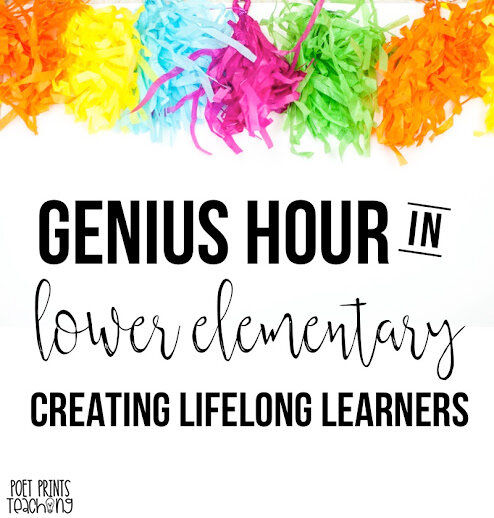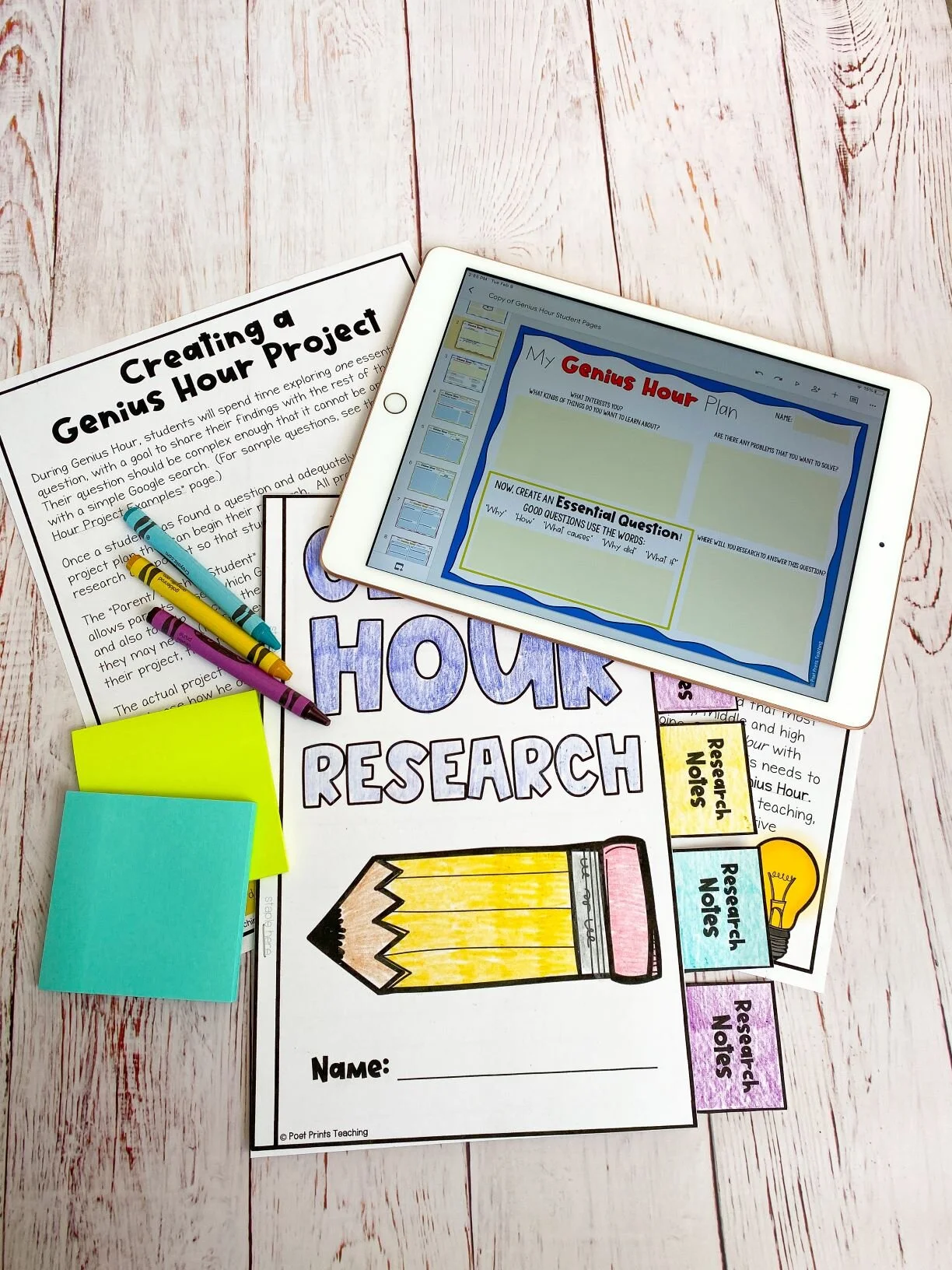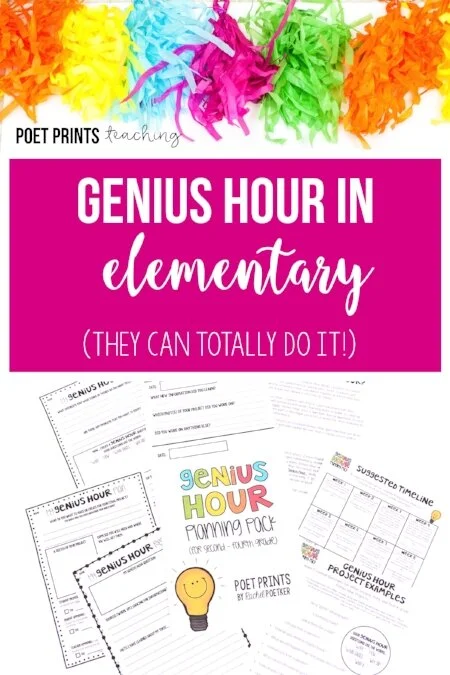Genius Hour in Elementary
A handful of years ago I did my very first Genius Hour in my third-grade classroom. For those who have never heard of Genius Hour, it is a student-directed hour of independent projects based on their own curiosities. time It gives students a chance to explore their passions and interests and allows them to develop a lifelong love for learning. Genius Hour also helps to hone research and presentation skills in a way that is 'outside of the box' and creative.
Genius Hour in lower elementary, creating life long learners.
Most of the blogs I had read ahead of time seemed to use Genius Hour in the upper elementary, middle, and high school grades. Looking back, I wonder if I was crazy to try it with eight-year-olds. Maybe I was. At times, it was insanely chaotic. I definitely 'bit off more than I could chew' and it was a lot more work than I anticipated. But it was such an overwhelming success with my students that I made it a permanent part of my third-grade curriculum and learned from the parts that I was ill-prepared for the first time around.
Most of the chaos and hard work came from being under-prepared. I hadn't fully thought through what it would take to prepare seven, eight, and nine-year-olds for independent work.
Yes, they are capable of it... but it takes scaffolding and intentional instruction to give them the tools to succeed!
So, learning from my mistakes, here are four tips for a smoother, well-planned Genius Hour in Elementary!
A complete plan is here!
I’ve taken everything I’ve learned from years of Genius Hour and created a complete digital and printable guide to starting up this engaging project in your second, third, or fourth grade classroom.
It has teaching guides, a week-by-week timeline, a sample day plan, project ideas, parent letters, student planning pages, rubrics, and more!
Model Everything
One of the most valuable things I learned in leading Genius Hour in third grade was to model all pieces of the process. Instead of telling my students to “come up with a topic”, I participated in Genius Hour alongside them and verbalized my thinking process out loud.
"What kinds of things am I interested in, I'll write them down! The ocean, hockey, running, cooking. I love to build stuff. When I was at the ocean I saw a family flying the most amazing kites, and they were doing loops. It was so interesting."
I didn't just say, "List the things you are interested in," I demonstrated how I would come up with some topics. In future lessons, I explicitly taught how to turn my ideas into an essential question.
"I love kites and the ocean," became my Genius Hour question "How do you build a kite?"
Genius Hour is driven by an essential question that students work each week to solve through research and hands-on exploration. (Each question cannot be solved by a simple Google search).
Eventually, I even gave a complete Genius Hour presentation. This way, my students were not caught off-guard by what I expected from a presentation. I built a simple kite in front of my students and showed what I had learned on a step-by-step poster.
This week-by-week timeline was my saving grace for staying on task for Genius Hour. It breaks down specific skills that students need to learn each week, and where their projects should be at any given time.
Narrow Down The Presentation Options
I have found that in older grades, students are so excited by the idea that they can choose any way that they want to show what they have learned. The world is their oyster!
However, when I tried this in Third Grade, most of my class looked at me like a group of deer caught in headlights. They were absolutely overwhelmed by the number of possibilities.
Should I do a poster?
What about a movie too?
Is a poster better than a movie?
I don't want to do a movie.
What if I code a video game? I don't know what that means. But maybe my brother does.
Do I have to do all of the options?
I was ready to pull my hair out. So we had a class meeting.
In our classroom, we decided that everyone would have a small poster (I bought the poster board) that showed what they learned, and then they could also have a small model or project if they wanted.
I would suggest narrowing down the options for how Genius Hour can be presented in lower elementary. As always, allow some students to go 'above and beyond' as they are ready and feel prepared, but don't make this the standard for all students.
Use Simple Ways to Keep Students Accountable
Genius Hour is only one hour long.
It seems like a lot but it will fly by. To keep students accountable I used a very simple Work Log where students simply answered the question "What did you do today?" At times, all they would write down was:
I colored my poster. And that was enough! Don't waste valuable time filling in a work log when you could be working on Genius Hour.
Check with Parents
This was one of the things that I learned in retrospect. I allowed students to choose any project of their choice without checking-in at home that each project was o.k. with their families.
It didn't go well for us.
Students assumed that they had access to a computer when they didn't. Or access to a poster board when they didn't. Or even a ride to the public library when they didn't.
This year, when my students create their Genius Hour plan, they will also need to have a parent/guardian sign off to make sure that their plan is reasonable. I don't want to put any undue stress on parents or families and hope that each project is one that my students can do (mostly) independently.
Future years’ project plans had a parent approval and suggestion section! Much needed after the first year!
Genius Hour planning pages, complete with space for parent or guardian approval!
looking for more about genius hour?
Keep on reading and learning about planning Genius Hour in 2nd, 3rd, and 4th grades with the rest of the Genius Hour blog series!
Genius Hour is a hands-on, inquiry-based learning experience in lower elementary. Your students will be SO engaged.





